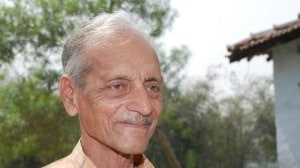Stay updated with the latest - Click here to follow us on Instagram
Mysore’s ‘last prince’ Wodeyar inherited love,loyalty and great fortune
The legacy of Srikantadatta Wodeyar,who died Tuesday,is not as immense though.
PRITHVI DATTA CHANDRA SHOBHI
Srikantadatta Narasimharaja Wodeyar,the last link to the storied Mysore royal family,passed away in Bangalore Tuesday. Wodeyar,60,was the only son of Jayachamarajendra Wodeyar,the last ruler of Mysore and the first governor of the erstwhile Mysore state.
He has no children,and is survived by his wife,Pramoda Devi.
A cricketer,entrepreneur,fashion designer and cricket administrator,Wodeyar,found most success in politics. A gold medalist in political science at Mysore University,he was elected to the Lok Sabha from Mysore four times 1984,1989,1996 and 1999 as a Congress candidate. Wodeyar also lost twice.
Despite his considerable electoral success,he rarely made an impact on politics either in Karnataka or in Delhi,as opposed to the achievements of his distant relative Devraj Urs,who shattered the Vokkaliga-Lingayat dominance of Karnataka politics by developing a new paradigm of backward caste politics in the 1970s.
Yet,Wodeyar enjoyed immense love and loyalty especially in the rural areas of Mysore region,which often translated electorally too. This was a testimony to the development strategies as well as social justice measures adopted by Wodeyars ancestors,thereby giving the Mysore princely kingdom the image of a modern progressive state.
These accomplishments of his family werent the only inheritance for Wodeyar. Even though he never sat on the throne,except on ritual occasions during Dasara,he was always referred to as the prince of Mysore. Apart from his title and royal privileges,Wodeyar also inherited substantial assets estimated at Rs 2,500 crore in an election affidavit by Wodeyar himself a decade ago.
But this inherited property was the source of significant legal trouble for Wodeyar. Along with his sisters,he often challenged the decisions of the Karnataka government,particularly with regard to the ownership status of the Mysore and Bangalore palaces.
Like other fellow princes,Wodeyar too entertained entrepreneurial ambitions. He would make grand announcements about setting up hotels,establishing a private university,digitizing Mysore palace library holdings,or starting a private airline. With the exception of occasional forays into fashion designing and promoting particularly Mysore silk,none of these projects came to fruition.
In the last decade,Wodeyar had been largely out of politics. His only substantial involvement in public life had come through cricket administration. A keen cricketer during his younger days,Wodeyar had led the Mysore University cricket team.
In 2007,Wodeyar was elected president of the Karnataka State Cricket Association after a bitterly fought campaign against the Brijesh Patel-led syndicate. Since Patel too was elected secretary,they had an uneasy co-existence for the next three years. However,in 2010,he lost to Anil Kumble in a close fight only to triumphantly return by defeating Kumbles nominee on December 1,2013.
His close associates were heard lamenting that the exertions of the elections may have proved fatal since his doctors had strictly instructed him to rest. Despite being prominently associated with Karnataka cricket,his actual role was quite peripheral,and often symbolic.
Wodeyars more notable public preoccupation in the last decade had been the legacy of his family. He spiritedly contested a script written by Lingadevaru Halemane,a Marxist playwright and linguist,which was to be used for a sound and light show at the Mysore palace. Wodeyar contended that his familys history and accomplishments ought to be highlighted as the singular factor in creating modern Mysore.
He demanded that everything else,including the contributions of people such as Sir M Visvesvarayya or the history of Hyder and Tippu,be deleted from this hour-long show. Halemanes script was altered several times but Wodeyar wasn’t satisfied. Even though the sound and light show has been occasionally held,it hasnt become a permanent feature at the Mysore palace. Wodeyar’s resistance has been a determining factor.
Wodeyars inheritance was immense. His legacy isnt. His royal counterparts from northern Indian states have had greater success both in politics and especially in business. Such success may have eluded him but in Mysore he remained a simple,decent but significant presence,especially during the annual Dasara celebrations. Even though the state government organized the event,he still had a significant ritual role to perform. Despite occasional tension with the new representatives of democratic Mysore,the old prince took care of his responsibilities. He will be remembered primarily for that.
Shobhi is a social historian based in Mysore







